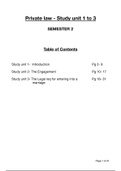Summary
Private Law 171- Summary of class and textbook notes ( Study units 1-3). (semester 2)
- Course
- Institution
- Book
This document contains study units 1-3 of semester 2, of Private Law 171. It contains all class notes and summarised textbook notes needed to obtain a distinction of upcoming tests and exams.
[Show more]




